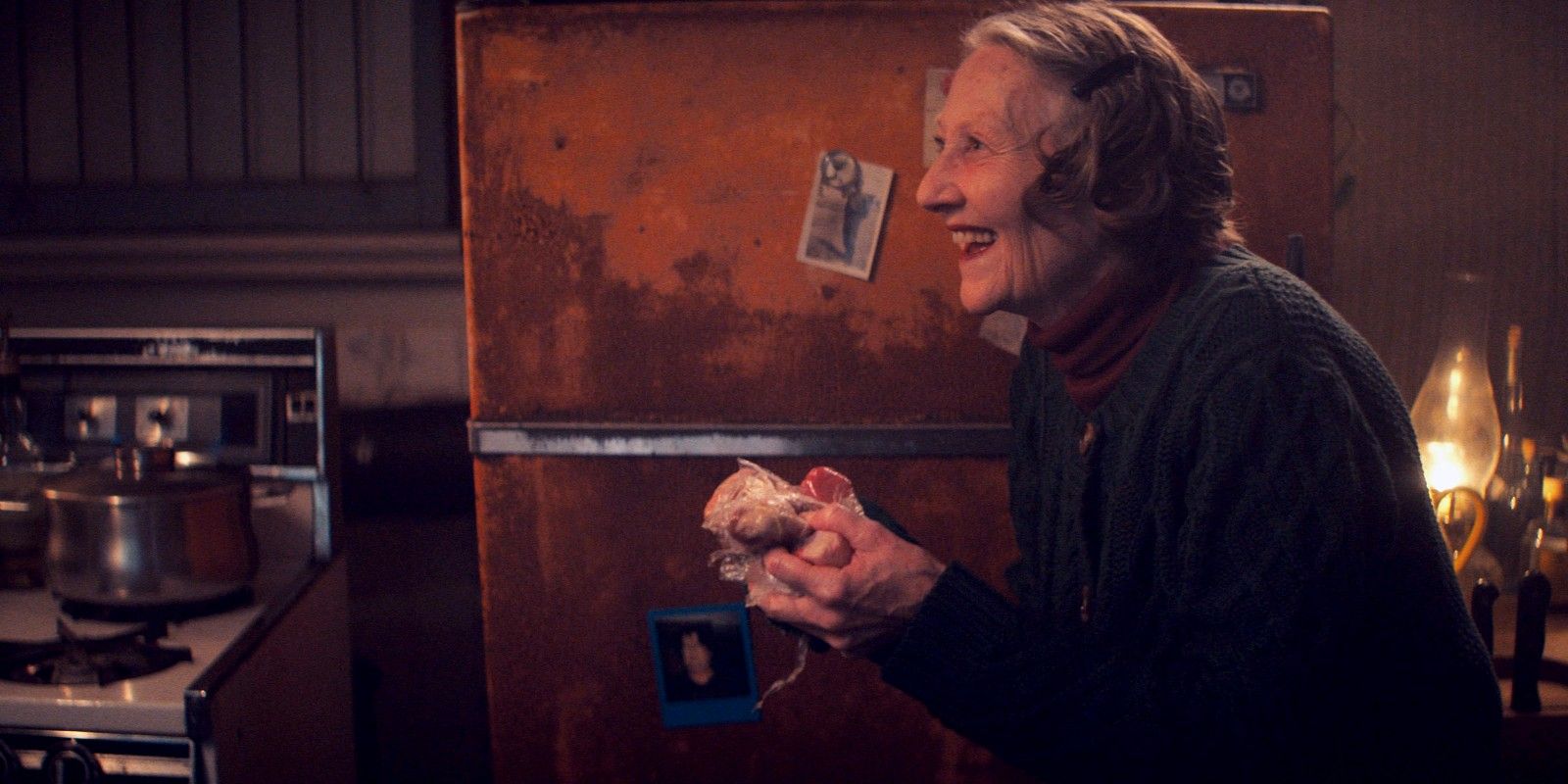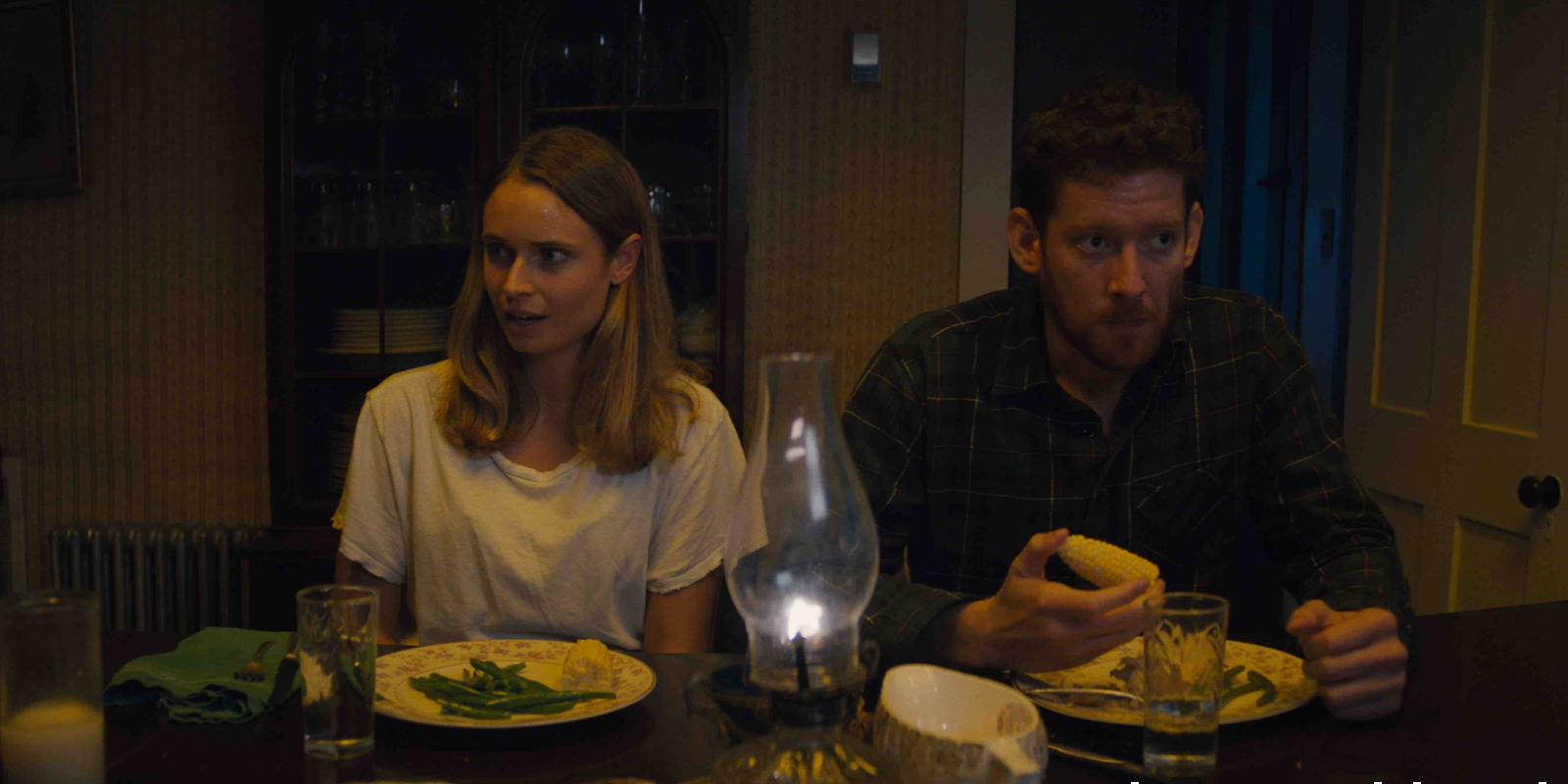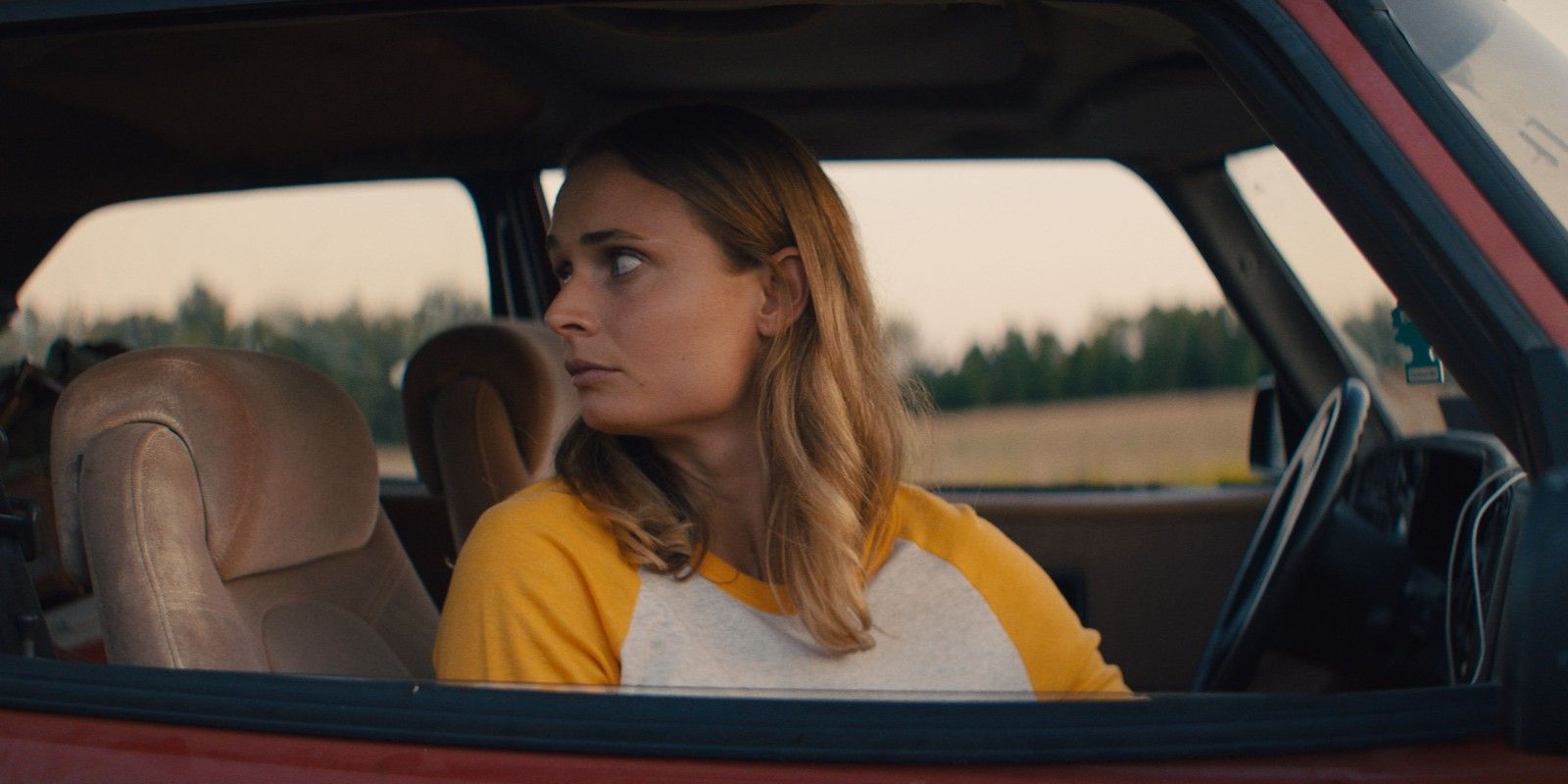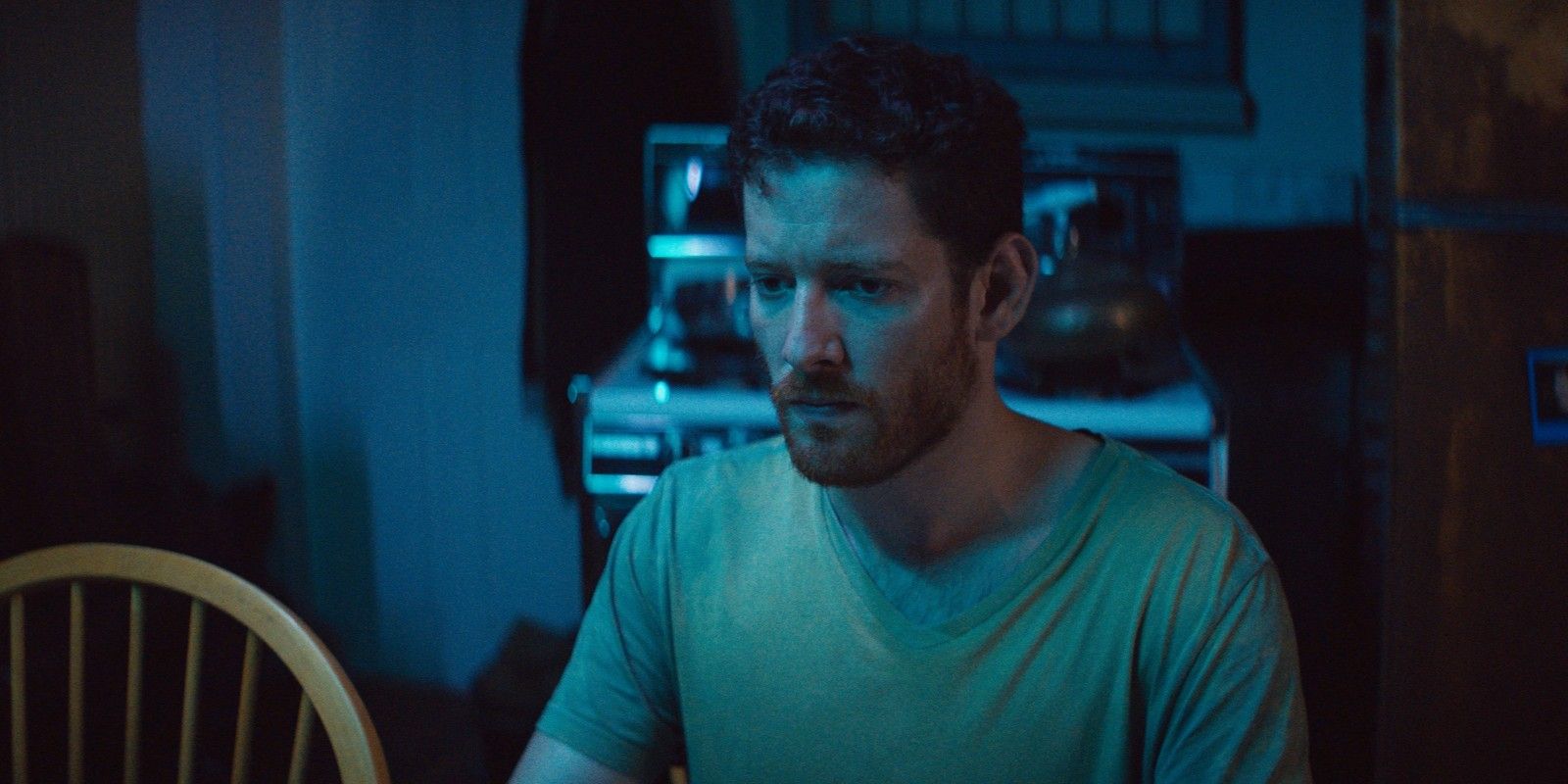WARNING: The following contains minor spoilers for Honeydew, now available on VOD.
Honeydew marks the feature film debut of director/writer Devereux Milburn and actor Sawyer Spielberg. The horror film, which was an official selection at the 2020 Tribeca Film Festival, follows a couple -- Rylie (Malin Barr) and Sam (Spielberg) -- as they take up refuge at an elderly woman's home after car troubles; however, something is wrong with their host, Karen (Barbara Kingsley), and her son, Gunni (Jamie Bradley), and the couple is in for a nightmarish evening. With the film's VOD release, Milburn talked with CBR in this exclusive interview about his New England take on the rural horror genre, as well as the influences that helped make the film what it is.
While watching Honeydew, it very much had this kind of modern Hansel and Gretel feel to it. Was that story a direct influence for you, and what other stories, if any, did you draw inspiration from?
It actually wasn't initially, and it wasn't until probably... I think I was in post that I -- or maybe a little bit like towards the the end of production at the beginning of post -- where I realized, sort of recognized the parallels with Hansel and Gretel, and I think some of it was subconscious, even writing it. I think there were elements there that I might have definitely had them somewhere in the back of my head, but it really wasn't until we sort of got shot out that I realized that, and it had something to do with how I edited it, once I did sort of decide that was definitely a thread in the narrative.
I mean in terms of influences for the story or the overall aesthetic, there are a few films I was watching a lot at the time. One was Rosemary's Baby, and that's one that I constantly return to for when I'm writing, whether it's horror, heavy genre or outside of that. The Devils, the Ken Russell film, was a big one, and Eyes Without a Face because it sort of had that familial element of having someone in a sort of parental role, thinking he or she is doing what's best for the protagonists, but in reality, they're completely out of their minds. Yeah, those had a big impact on sort of where I went narratively. Also, I was watching a lot of Who's Afraid of Virginia Woolf and Whatever Happened to Baby Jane, which obviously aren't horror films, but there was something there with camera and mood and sort of the frantic interactions of the characters that I sort of drew upon.
I haven't seen Baby Jane in a while, but now that you mentioned it, I see the connection there.
There are moments.
Speaking of the writing and stuff like that, what prompted you to tell this story specifically?
I'd been writing a feature adaptation of a George Saunders' short story called "The 400 Pound CEO." This was 2017 when we first sort of decided we wanted to make this film, and I'd been writing this other film and was really getting sort of frustrated with how long it was taking to get off the ground, and my friend Dan -- Dan Kennedy, who shot the film and was a co-producer -- just texted me and said, "Do you want to shoot a horror feature like next month?" And I said, "Yeah, let's do it," sort of thinking this seems completely impossible.
It initially sort of started as a very small scale let's just get our friends together and make a film and turned pretty quickly into something a bit deeper and more twisted. It's sort of, the plot started off more as a creature film, but still focusing on a couple on a camping trip, and it grew into this other sort of offshoot of that.
This sort of spark for the sordico element and that whole through line came from an article a friend sent me about a small village in France in 1950s where there was this mass poisoning from ergot, which is a fungus commonly found on rye, and typically it grows in rye fields and farms, and a lot of the time, if it's not tended to, livestock will eat it and die, essentially. It'll create a huge blight, and everyone will panic, but when humans eat it, it doesn't necessarily kill them right away. It can infect them with gangrene and cause hallucinations, and depending on how long you consume it, you can go crazy, and that's what happened in this town called Pont-Saint-Esprit, where everyone was just sort of losing their minds and developing these horrible gangrenous wounds and not knowing what it was, and they discovered that it was the local bakery that was distributing all this rye bread that had the fungal ergot in it.
I just thought that could be a really effective and interesting concept for sort of a through line and a way to attach Rylie and Sam more to the land and more to Karen as an antagonist, and also relate it to this idea that I've been sort of batting around about body image and dieting and weight control in this other film I've been writing, so I definitely injected some of those themes into Honeydew.
Nice, and kind of speaking about what you're talking about with the agriculture and going a little bit back to what you're talking about the cinematographer, one thing that I was really taken away by was how gorgeously shot the film was, especially with the environment. The outdoor scenes, the forests, the agriculture really stood out. I was wondering what role you wanted that environment to play in this film.
Yeah, so Dan is from New England. He's from New Hampshire, but he's also lived sort of all over, especially in Massachusetts, and has a lot of a lot of connections to people who live in rural areas in New Hampshire and Massachusetts and other parts of New England. Initially, that was sort of the initial draw of shooting it there, and part of it was to cut costs and locations. We had some connections with some of the locations that the main... the picture house that we use is an Airbnb, and we're really lucky to find that, but he just has a familiarity with the area. I think, a combination... I was born in Boston and spent a lot of time in Rhode Island with family, and it's definitely sort of close to my heart, that landscape and also the dialects, and this sort of overall aesthetic of the interiors and exteriors are all very much sort of the more decayed versions of what I experienced growing up, and what he experienced as well. I just liked the idea of there being this sort of putrid world set aside from everything else, that's not necessarily... that looks sort of picturesque and doesn't have the immediate appearance of being dangerous or unseemly.
Especially for those opening sequences, when they're driving to the campsite, I definitely wanted there to be some sense, as there often is in horror films, at the outset of serenity and beauty, and then sort of as the film progresses that becomes sort of... it drops into the shadow of night, and everything is very much focused on the insanity of the people who have held them captive. I think a lot of people think of New England as a very sort of sweet, luxurious place to live or to summer, and the idea was, in some respects, to sort of flip the rural backwoods horror on its head a bit in terms of setting and use a bit more of the East Coast... apply a bit more of an East Coast element to it.
Right. Yeah, I didn't realize when I was watching it first that was New England, because I'm from the West Coast. And I was like, "oh," and then there's a line they drop that it's New England, and I'm like, "oh!"
I think a couple people had that reaction, and we actually, there was a point a couple of weeks before we went into... or maybe a month before we went to production where we were still, I was still messing with the latest draft, and we're trying to figure out... we just cast Barbara for Karen, and I think it was probably a month before production -- I could be slightly off on that -- and we're trying to figure out her dialect and what type of accent we wanted for her, and my grandmother has a very distinct -- or had a very distinct -- Rhode Island accent. It's the type of accent that people just don't have any more unless you grew up in Rhode Island in like the '10s and '20s.
And I showed [Barbara] a video of that accent, and I thought it was just way more sort of unique and warped sounding than I thought a southern accent would be. I, in many ways, center the location around how Karen seems and sounds just because everyone's just seen so many of those rural horrors that are set in places like West Virginia and Appalachia. That was part of the decision was like, "Who is Karen?" How does Karen fit here? And how is she different than other quote unquote villains in the genre?
And that kind of leads into my next question. What about Karen was the most intriguing for you to write and direct? What makes her such a standout villain, especially in the rural horror genre that has these kind of like farm friendly people, and it's like, "oh, they're kind," and then later on you're like, "they're not kind?"
I think in writing her, you know, I sort of keep referencing my grandmother because she was someone who was very sweet, and she didn't really have a deep dark side obviously like Karen or anyone. She was pretty benign, but she did have a lot of character in her face and the way she walked and the way she talked, and she would often sort of just... she always seemed to be singing or whistling something or doing a combination of the two, where it was like a sort of half whistle half hum, and in the creating of the character, I wanted Karen to be made up of a lot of affects and effects.
I wanted her to not always be present and not always be necessarily in the room with the people who she was in front of. I wanted her to sort of be in another world and be so infected by sordico and so infected also by her sort of plans and designs for what she wanted to do with them that she was often distracted and not entirely present and cogent, but always trying to appear so. I knew that for me... I also gave Karen, as I did with all of the characters, a bunch of backstory that went way back to her childhood and her sort of feeling very much abandoned by her family and experiencing a lot of death and sort of wanting -- outside of the religious component -- wanting to create her own family in this sort of sick and twisted way out of, you know, people sort of passing through and being able to sort of have a bit of an audience, which of course is exacerbated by her being infected with this fungus.
Speaking of the other characters, one thing that stood out to me was the dynamic between Rylie and Sam. They feel like a pretty well established relationship, and there's already this tension between the two, prior to them entering the house. What type of dynamic did you want to depict with them, and why did you want to depict this type of relationship in your movie?
I think at first the Rylie Sam relationship was based on little sort of nagging moments between me and my wife. And it was very much more sort of background and benign and sort of mostly amicable, with like sort of punctuated by moments of frustration and hostility, sort of playful hostility, and that quickly became a couple who's, you know, on the verge of deciding whether or not they want to stay together, and they're just not getting along. I think the reason I went that route is because I just thought it was funnier, for one.
It was more fun to write. It was more fun to direct and more fun for the actors to find that, and it also gave Karen an opportunity to sort of slide into Sawyer's DMSs, so to speak, and sort of present herself as an appealing alternative to Rylie, who's sort of preventing him from accessing the pleasures that he's more familiar with. You know, in establishing them being sort of their relationship being on the ropes, I opened it up for Karen to appeal more to Sawyer's sensibility in that very specific moment and appeal more to his senses, to put it more literally.
Food is something that he gets a lot of pleasure from and a lot of relief from, and he's clearly at a point in his life where he feels uncomfortable and nervous and restless, and you can see the minute he's offered food or the minute he's offered warmth and access to pleasure, he feels it. There's a sense of relief, and of course, that doesn't last very long. But yeah, so that was the main... that was the initial impetus to sort of put a wall between him and Rylie.
Wrapping this up, what do you hope audiences take away from Honeydew.
I hope that they're captured by the world. My main goal in making this film specifically -- but with anything that I write and develop -- is that the texture and the aesthetic of the film as a whole and of the characters sucks you in, even if it is a slow burn, even if there is a sort of a moment where you might be sort of tapping your heel and waiting for something bigger to happen. I want people to have the sense that they're inside of something.
I think most of my favorite films are ones that I've had to watch, you know, three, to five, to 10 times before they became my favorite films, but for some reason I return to them because there was something I either didn't understand or there was a collection of details that I wanted to sort of go back and be able to string together. I wanted Honeydew to have that effect. Whether or not people love it on their first viewing or are intrigued or feel one way or another, I want it to sort of spark something. Whether or not that's fear, you know, might be that people are really freaked out by it. Some people seem to be really freaked out by it, and some people think it's funny, which is another goal. And some people, you know, are sort of infuriated by it, and I love all those reactions. I think the more polarizing it is, especially when you're working in genre, the more you're succeeding.
Directed by Devereux Milburn, Honeydew stars Malin Barr, Barbara Kingsley and Sawyer Spielberg and is now available on VOD.




